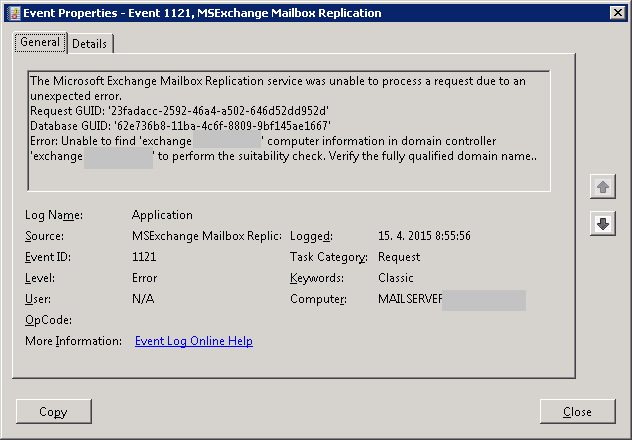Customer requested to force active directory accounts to expire on midnight or in the night and not during the day. So I’ve created following script to do so:
$UserList = Get-ADUser -Filter * -SearchBase "OU=USERS,DC=domain,DC=local" -Properties "DisplayName", "PasswordLastSet"
$Today = (Get-Date)
$MaxPasswdAge = (Get-ADDefaultDomainPasswordPolicy).MaxPasswordAge
ForEach ($User in $UserList)
{
$ExpireDate = ($User.PasswordLastSet) + $MaxPasswdAge
$DaysToExpire = (New-TimeSpan -Start $Today -End $ExpireDate).Days
If ($DaysToExpire -eq 1)
{
Set-ADUser -Identity $User -ChangePasswordAtLogon $true
}
}
#EOF
This script runs everyday at 23:55.
I found couple examples how to change pwdLastSet attribute on AD user’s object, but I don’t like that. I think this is cleared way to do so.
Have a nice day,
Problem
One of our customer has two branches. There is Site-2-Site VPN (based on Cisco ASA devices) between those two branches. There was weird problem when traffic went through that Site-2-Site VPN tunnel. Some communications were fine, but most of them didn’t work. Problems that we noticed:
- OutlookAnywhere didn’t work
- Domain controllers from both sides couldn’t replicate
- HTTPS connections didn’t work
- ESX client didn’t connect to ESXi server via tunnel (Call “ServiceInstance.RetrieveContent” for object “ServiceInstance” on Server…)
Solution
Change MTU on computer to something lower than 1500 MTU. You can use following commands:
netsh int ip show int
netsh interface ipv4 set subinterface “Local Area Connection” mtu=1300 store=persistent
If everything works, you need to adjust MTU on Cisco ASA devices. There is great article about it HERE. We used Method 2.
This change made local administrators very very very happy 🙂
I migrated from Exchange 2003 to Exchange 2010 and since then I was receiving following event:

Event says:”The Microsoft Exchange Mailbox Replication service was unable to process a request due to an unexpected error”. Which means server cannot finish some request. In order to solve a problem I was looking for some replication settings. I found none. Then I looked into domain using ADSIEdit. I looked into:
CN=MailboxExportRequests, CN=MailboxReplication, CN=TeamSK, CN=Microsoft Exchange, CN=Services, CN=Configuration, DC=domain, DC=local
and I found there some old orphan move requests:

When I used Get-MoveRequest cmdlet there was none move request displayed. So I’ve deleted those old move requests using ADSIEdit and there was no more bothering event on Exchange server.
Have a nice day,


Recent Comments